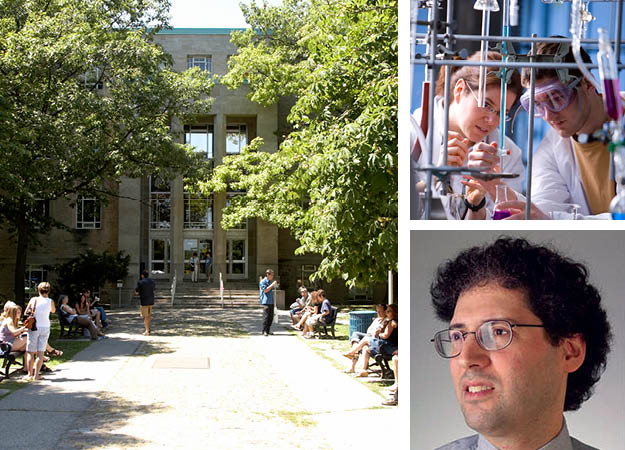NSERC earmarks $13.6M for discovery research at McMaster

'These Discovery programs provide our researchers with the support they need to continue to make important breakthroughs across every field in natural sciences and engineering,' said Mo Elbestawi, vice-president, Research and International Affairs. Rafael Kleiman (bottom right), will use his portion of the funding to help further his research into high-efficiency solar cells.
The Government of Canada and the Natural Sciences and Engineering Research Council (NSERC) are investing more than $13.6 million in research at McMaster.
The funding will support 79 McMaster research initiatives over terms ranging from one to five years. These awards comprise the competition results for two major award categories — Discovery Grants and Discovery Accelerator Supplements (DAS).
One of five recipients of both awards is engineering physicist Rafael Kleiman, whose research is in the intensely competitive field of developing lower cost, high-efficiency solar cells.
The ability to harness the sun’s energy inexpensively and efficiently in the most common type of solar cell is a fine balance between the performance and cost of the silicon wafers used in the solar cell.
By drastically reducing the thickness of the silicon solar cells — from today’s standard thickness of about 150 microns — to just five microns, the cost and energy to produce the silicon is dramatically reduced. Because silicon is a weak absorber of light, when you make it thinner, it also absorbs less light.
“Those are the scientific challenges. First, how do you make the silicon thinner? Then, once you have made it thinner, what’s the best way to trap light to increase the absorption of light in the silicon solar cell?” said Kleiman, director of the Centre for Emerging Device Technologies. “Texturing the silicon allows the capture of more light, yielding higher efficiency solar cells.”
The additional resource of the Discovery Accelerator Supplement will allow Kleiman to expand his research group by one more postdoctoral fellow.
“In a field where there are new developments every day, adding another member to my team will speed things up in my research and allow me to try more things in parallel,” he said.
The other four McMaster researchers receiving funding from both programs have also been recognized for their well-established research programs, and their strong potential to become international leaders in their respective areas of research.
The researchers are: Shahin Sirouspour, associate professor, Electrical & Computer Engineering; Grant McClelland, associate professor, Biology; Giuseppe Melacini, associate professor, Chemistry & Chemical Biology; and Gregory Slater, associate professor, School of Geography and Earth Sciences.
“These Discovery programs provide our researchers with the support they need to continue to make important breakthroughs across every field in natural sciences and engineering,” said Mo Elbestawi, vice-president, Research & International Affairs. “Researchers such as Rafael Kleiman – whose work to advance solar cell performance – exemplify the kind of research we do here at McMaster that will have a tangible impact on areas that are of vital importance to global society.”
“By supporting over 3,500 researchers and students in Canada, our government is providing the right kind of help to push the frontiers of knowledge in science and engineering and ensure Canada’s leadership for years to come. In so doing, we are developing, attracting and retaining the world’s most talented researchers who carry out the scientific research that creates jobs and prosperity and improves the quality of life of Canadians,” said the Honourable Ed Holder, Minister of State (Science and Technology).
The financial breakdown is as follows:
McMaster has been funded for 73 research projects totalling $12.475 million, and received more than $500,000 for six researchers for equipment and tools. The Discovery Grants Program funds ongoing programs of research in every scientific and engineering discipline. The Discovery Accelerator Supplements — awarded to accelerate progress and maximize the impact of superior research programs — are valued at $120,000 over three years and provide the researcher with additional resources to compete with the best in the world.
A complete list of the research grants awarded to McMaster in this competition can be found here.
